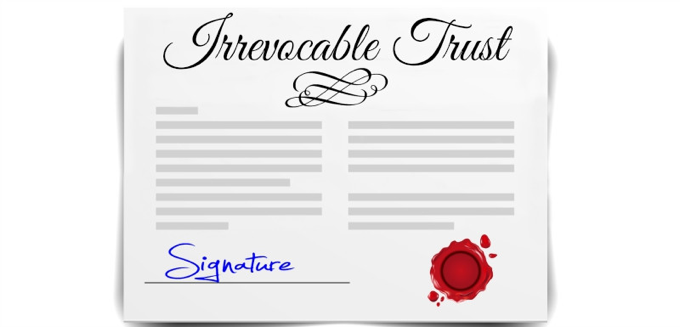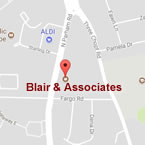Can’t Have One Without the Other
October 2016
Earlier this year, the Blair Bulletin featured the topic of Estate Planning to deal with the unknown future, provide peace-of-mind for your family and create an orderly transition of assets in the event of death or disability. As stated in that article, estate planning is not a do-it-yourself project. Additionally, estate plans are not a one-size-fits-all endeavor.

Your best course of action is to seek help from experienced experts that specialize in estate planning matters. Once chosen, your advisors will determine the issues to be addressed and the appropriate documentation required to ensure instructions consistent with your desires.
Among the documents your advisors may recommend are one or more trusts. As a general definition, a trust is a fiduciary arrangement under which one person or entity, called a trustee, holds legal title to property for a beneficiary or beneficiaries. The benefits of a well-crafted trust may include minimizing estate taxes and avoiding probate. The Blair Bulletin dealt with this topic in more detail in our May 2016 issue. In this issue, we’ll deal with what to consider when you are contemplating the choice of a trustee.
(Next issue we’ll address “when you are asked to serve as a trustee”.)

Choosing a Trustee
Competence: Your trustee will shoulder significant responsibilities on your behalf. Choices should never be made simply because an individual is a family member or close friend. Your selection should reflect the individual’s capabilities and willingness to fulfill the required duties of the role he or she is expected to play. Alternatively, you may appoint an accomplished third-party corporate trustee such as a bank or trust company.
Individual as Trustee: Often, it is tempting, if not expedient, to choose an individual trustee who is a family member, close friend or trusted business associate.
Caution! Selection of a trustee requires careful consideration of who is best qualified to protect the assets you have set aside as a legacy for your chosen beneficiaries. Here are three important elements to that decision process:
1. Capable, Experienced & Willing to Serve
Is the candidate one who is not only intellectually and physically capable to undertake the duties of Trustee, but also has experience in managing assets similar to those in the trust? Alternatively, does the potential nominee have the management ability to enlist the aid of experts to assist in areas where his or her proficiency is lacking?
Additionally, after diligently assessing the potential trustee’s skills and confident they are adequate, approach the person and assess their willingness to participate. It’s important that the individual expresses and exhibits both a competency and readiness to serve.
2. Effect on Family Relationships
Will the choice provoke family strife? For example, choice of one sibling as trustee over others may leave the others feeling less than adequate in your eyes. Additionally, there may be individual rivalries or unresolved past issues that could put pressure on the designated trustee in the performance of required duties, e.g. requests for accelerated payouts and challenges to the way trust assets are being administered.
Certainly, all members of the family and other beneficiaries must be fully apprised of the considered choices for trustee and ideally reach a consensus, if not unanimity, on the selection.
3. Protection of Trust Assets
The trustee is a fiduciary of the trust beneficiary (or beneficiaries). As such, the trustee is legally bound to act, lawfully, in the best interests of the beneficiary. In that context, the trustee is in the preferential position of confidence in having control of property that is really owned by the beneficiary.
While the future is unknown to any of us, consideration must be given to the current status of trustee candidates that indicates their ability to perform in an objective and impartial manner. That would include any personal or professional issues that might compromise judgment.
We’ll address that in a moment discussing successor trustees and co-trustees.

Third-party Corporate Trustee: In some cases, a bank or other corporate trustee is preferable to appointing an individual in the role. That would be a logical choice to consider especially if the estate is large (many experts agree in excess of a few hundred thousand dollars) and/or complicated in its makeup of assets, investment requirements and distribution instructions.
A bank, trust company or law firm that offers trust services also may provide peace of mind in knowing that there is no interruption in managing the trust in the event of the death or other incident of removing an individual trustee. One way this is often done is by designating a corporate trustee as the successor trustee in the event of the death or other reason for removal of an individual trustee.
Of course, there will be costs associated with employing a corporate trustee and those must be carefully reviewed and evaluated. Fee structures and pricing strategies can vary significantly from one institution to another.

Co-Trustees: A hybrid approach is to name co-trustees who will work in tandem to manage the trust. This often provides for a balance in competencies, where one trustee may provide support his or her counterpart is unable to deliver.
This arrangement also may provide for a financial institution or law firm to be the sole successor trustee in the event of death or replacement of individual trustees.

Summary
Depending on the complexity of your estate, your desires for your beneficiaries and tax-saving issues, your team of trust advisors will work with you to craft one or more trusts that will satisfy your objectives. Your advisory team will likely enlist the aid of accounting, legal, investment and insurance professionals.
From the accounting side, we at Blair + Assoc stand ready to serve with consultation as well as filing the following documents:
• Inventories
• Court accountings
• Final income tax returns for the deceased
• Estate tax returns
• Trust income tax returns.
Finally, there are costs associated with creating and maintaining a trust. That means a conversation around ranges in costs, preparation time and ongoing administrative considerations are an excellent first step. Give us a call or drop an email to set up a no-cost initial consultation.
One last thought: we work with a number of skilled trust and estate professionals. If we can help with a referral … just ask.

